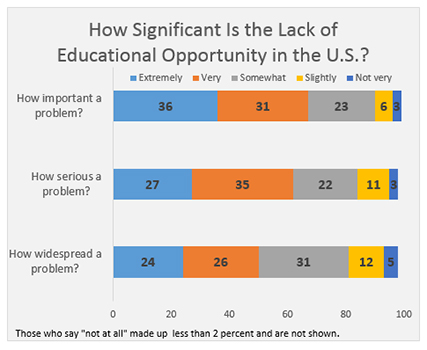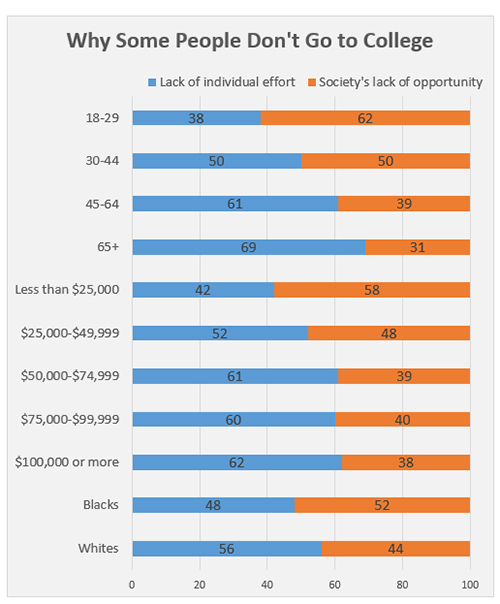Lack of Opportunities in Higher Education: Fault of the Individual or Society?
3/2/2016
The new Fishlinger Center for Public Policy Research at the University of Mount Saint Vincent seeks to foster meaningful dialog on key public policy issues through independent, objective public opinion research. This initial survey focuses on social issues in the United States.
This is the fifth report from the survey; the earlier reports concentrated on human trafficking, the lack of affordable health care, root causes of poverty, and domestic violence. Additional reports on other social problems covered in the survey will be released in the coming months.
Nearly two-thirds of Americans consider the lack of educational opportunities in the United States to be a serious problem. More than half of the public see the failure of achieving a college education to be more an individual’s responsibility rather than society’s, however there are substantial differences by age and income.
The poll was conducted online May 14 to 26, 2015 with 1,253 adults. Field work was conducted by IPSOS Public Affairs. Blacks, Hispanics and Asians were sampled at a higher rate than their proportion of the population for reasons of analysis.
Importance of the Issue
Two-thirds describe the lack of educational opportunities in the United States to be extremely or very important, and nearly as many consider it to be a serious problem. Younger people, who presumably have recent experience with formal education, are more likely to view this as an important issue than older Americans.
 In recent years, while the high school graduation rates have increased, the percentage who immediately enroll in college has decreased, according to the National Center for Education Statistics.
In recent years, while the high school graduation rates have increased, the percentage who immediately enroll in college has decreased, according to the National Center for Education Statistics.
About a third of Americans say they know much about the lack of educational opportunity in this country or have read much about the issue.
There is widespread agreement that educational opportunity is not an issue that is being adequately addressed in this country. Only 20 percent say it is being dealt with to any real extent.
No College Education: Fault of Individual or Society?
According to a report recently issued by the American Council on Education, college enrollments in two- and four-year institutions among recent high school graduates has declined in recent years. But that drop has been most significant among the lowest-income students.
 While most Americans say the lack of higher education is caused more by the individuals’ effort rather than lack of opportunity, blacks, younger, and less affluent people are more inclined to blame society than whites, older people or those with higher incomes. Americans who are familiar with diminished prospects for a college education are also more inclined to say the lack opportunity is more at fault, rather than insufficient efforts on the part of a person. Thirty-seven percent say they know someone personally who has experienced a lack of education opportunity. Two-thirds of them blame society for this. The opposite is the case for people who are not familiar with anyone who has had less chances to attend college. Two-thirds of them hold the individuals themselves responsible.
While most Americans say the lack of higher education is caused more by the individuals’ effort rather than lack of opportunity, blacks, younger, and less affluent people are more inclined to blame society than whites, older people or those with higher incomes. Americans who are familiar with diminished prospects for a college education are also more inclined to say the lack opportunity is more at fault, rather than insufficient efforts on the part of a person. Thirty-seven percent say they know someone personally who has experienced a lack of education opportunity. Two-thirds of them blame society for this. The opposite is the case for people who are not familiar with anyone who has had less chances to attend college. Two-thirds of them hold the individuals themselves responsible.
Survey Methodology
The fieldwork for the Fishlinger Center poll was conducted by Ipsos Public Affairs. Online interviews with 1,253 adults were collected May 14 to 26, 2015. Sampling for the survey used a blended approach, combining the Ipsos iSay panel with Ampario sample (a blend of external panel and non-panel sources). Ipsos measures the precision of its online surveys using a credibility interval to measure sampling error. The survey of 1,253 respondents has a credibility interval of plus or minus 2.8 percentage points. The credibility interval may be larger for subgroups. The poll is subject to other potential sources of error, including, but not limited to coverage and measurement error. Data were weighted to match the national population on age, sex, Hispanic origin and race. For purposes of analysis, black, Hispanic, and Asian respondents were oversampled. These groups were then weighted down to their proper proportion of the population.
About the Fishlinger Center for Public Policy
The Fishlinger Center for Public Policy Research opened in February 2015 at the University of Mount Saint Vincent. The Center, a member of the American Association for Public Opinion Research (AAPOR), conducts deep and broad studies of public opinion on key public policy concerns through independent and objective research conducted by students, faculty, and other members of the academic community.
By providing a forum for discourse that can stimulate intelligent dialog about issues that deeply affect all Americans, the Center illustrates and enhances the relationship between the work of the College and the common good.
About the University of Mount Saint Vincent
Founded in 1847 by the Sisters of Charity, the University of Mount Saint Vincent offers nationally recognized liberal arts education and a select array of professional fields of study on a landmark campus overlooking the Hudson River. Committed to the education of the whole person, and enriched by the unparalleled cultural, educational and career opportunities of New York City, the College equips students with the knowledge, skills and experiences necessary for lives of achievement, professional accomplishment and leadership in the 21st century.
